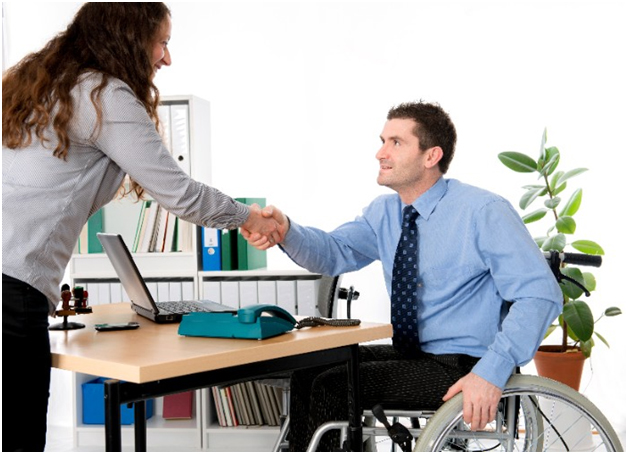
- What resources are available to help individuals with paralysis become attorneys? Resources such as pre-law programs, scholarships for aspiring lawyers with disabilities, and counseling services can help individuals with paralysis become attorneys.
- What is the power of overcoming adversity? The power of overcoming adversity is pushing forward despite difficult circumstances and making something great out of the situation. It is a testament to the strength of the human spirit and resilience.
- How can paraplegic attorneys serve as an inspiration? Paraplegic attorneys serve as an inspiration by demonstrating that success is achievable when we are willing to put in the necessary effort and dedication regardless of our circumstances.
- What advice do paraplegic attorneys offer to those with physical disabilities? Paraplegic attorneys advise that anyone can still achieve their dreams, even with physical limitations. With the right strategies and determination, success is achievable.
- How do pre-law programs assist students with physical disabilities? Pre-law programs offer accommodations such as alternate test-taking methods, note-taking assistance, and other support services tailored to the student’s needs.
Going into law is a challenging feat. Pragmatic and challenging, the demanding field of legal studies requires hard work and dedication to become a practicing attorney. But what if you spent your life defying the odds? What if, instead of being just another face in law school classrooms or courtrooms around the country, you had to overcome physical impairments or severe adversity while pursuing a dream career as an attorney? This is precisely what paraplegic attorneys go through every day, but despite their disabilities, they keep pushing forward against all odds in high-pressure environments. Paraplegic attorneys are achieving success by finding new ways to navigate intensely competitive fields, inspiring others with determination driven by unique life perspectives. This article will explore how these brave individuals continue thriving despite many challenges that traditional law students never have to consider.
What is Paralysis, and How Does It Affect Attorneys?
Paralysis is a medical condition that causes a person to lose all or part of their ability to control voluntary movement in their body. It can result from an injury, stroke, or other neurological disorder, depending on the type and cause of the paralysis. Accidents are the most common causes of spinal cord injuries, which can lead to paralysis. Research shows that motor vehicle crashes, falls, and violent crimes are the main sources of these injuries. Damage to the spinal cord can lead to either full or partial loss of motor control and sensation in the body. The effects of paralysis vary greatly depending on the location and severity of the damage.Paralysis can be complete, where all muscle activity is lost in a particular area, such as when there is damage to the brain or spinal cord, or it can be incomplete when some muscle activity remains. Depending on the area affected by paralysis and the severity of the symptoms, an individual may experience paralysis in only one part of their body (monoplegia), two parts (diplegia), three parts (triplegia), or four parts (quadriplegia).
The consequences of a traumatic injury that leads to paraplegia or quadriplegia can be catastrophic for the victim and their family and friends. In the most severe cases, these injuries can be life-threatening. Victims of these injuries often lose the ability to care for themselves and may now require assistance from a full-time or part-time therapist or nurse to help with activities such as eating, dressing, bathing, and moving around. This life-changing injury can have lasting physical, emotional, and financial repercussions.
Paralysis affects attorneys in various ways. In some cases, physical impairments resulting from paralysis may make it difficult for attorneys to perform essential daily tasks. For example, suppose an attorney has suffered arm or hand paralysis due to a stroke. In that case, they may be unable to write accurately and effectively enough to prepare legal documents and briefs. Additionally, if an attorney has difficulty speaking due to partial tongue paralysis due to a stroke, they may struggle with communicating clearly during trials and client meetings. Paralysis can also affect an attorney’s mobility and ability to access courtrooms or law offices. Furthermore, attorneys with paralysis are more likely to experience fatigue faster than those without disabilities due to additional physical exertion required for everyday activities such as walking and standing for extended periods.
Famous Attorneys with Paralysis
The topic of famous attorneys with paralysis is an inspiring one. Throughout human history, individuals facing the challenges of paralysis have achieved greatness, and attorneys are no different. Many attorneys have used their wit and strength to overcome their physical limitations and become successful in their chosen fields.One of the most famous examples is Martin Luther King, Jr., a civil rights attorney who overcame his early-onset paralysis to lead a successful legal career defending African-Americans’ right to vote. He faced many obstacles because of his condition, but he was determined to change the world and help pave the way for future generations. His achievements earned him admiration from people worldwide, including being awarded the Nobel Peace Prize in 1964.
Another attorney who suffered paralysis is David Wenzel. Wenzel is a prominent trial lawyer who has argued cases before the Supreme Court and has represented high-profile clients such as Microsoft and the NFL. Wenzel became paralyzed in a car accident in 2001, and his life changed dramatically as he had to learn how to live with paralysis. Despite this setback, Wenzel has continued to excel in his field, becoming a leader in accessibility law and disability advocacy. He is a staunch advocate for the rights of disabled persons, fighting to ensure that their rights are respected and protected. Wenzel is a member of the American Bar Association’s Commission on Disability Rights, which works to ensure that legal services are available to all persons regardless of physical or mental disability. He also serves as a board member and advisor to various organizations focused on helping people with disabilities. Wenzel’s experience with disability has uniquely qualified him to help those who face similar challenges in their daily lives.
In addition to these two famous examples, many other successful attorneys live with paralysis who have made outstanding contributions in their fields.
- Alan Dershowitz - Dershowitz is a renowned criminal defense lawyer and legal scholar representing high-profile clients such as O.J. Simpson and Jeffrey Epstein. In 1995, he was diagnosed with multiple sclerosis and used a wheelchair. Despite his disability, Dershowitz has continued to practice law and is currently a professor at Harvard Law School.
- Jose Manuel Diaz - Diaz is a Cuban-American lawyer who has represented clients in high-profile criminal cases, including the defense of Elián González. In 1997, he was paralyzed in a car accident and has used a wheelchair ever since. He has continued to practice law and is a partner at the Diaz Reus law firm in Miami.
- Ed Roberts - Roberts was an American disability rights activist and the first severely disabled student to attend the University of California, Berkeley. He was paralyzed from the neck down due to polio and used a ventilator to breathe. Roberts received his J.D. from the UC Berkeley School of Law in 1977 and worked as a mediator and arbitrator. He was also a key figure in the development of the Americans with Disabilities Act.
- Andrew W. Gurman - Gurman is an American lawyer and former president of the American Medical Association. He has been a paraplegic since a car accident in 1980 and uses a wheelchair. Gurman has continued to practice law and is currently a partner at the law firm of Gurman & Turner in Chicago.
- Attorney Dr. Susan Mokhberi is a quadriplegic with limited mobility due to spinal cord injuries she sustained as an infant; she has become an advocate for disabled people throughout her career.
- David Ferleger – This Philadelphia-based attorney was paralyzed in a car accident when he was just 18 years old. After graduating from the University of Pennsylvania Law School, Ferleger founded the Disability Rights Law Center. Through his work and advocacy, he has helped to advance civil rights for people with disabilities.
- Anthony Boitano – This San Diego-based attorney was paralyzed when he suffered a spinal cord injury during a swimming accident. Despite his paralysis, he graduated from law school and began to practice law. Boitano is a champion of disability rights and has worked on numerous cases that have helped to shape the legal landscape.
1. Christopher Reeve
The late actor who famously portrayed Superman in the 1978 movie is an icon of courage and determination after being paralyzed due to a horse-riding accident.2. Anthony Carbajal
An advocate and founder of the non-profit organization “My Life My Power,” he was diagnosed with ALS at 29 and currently uses a power wheelchair.3. Stephen Hawking
The world’s most famous physicist and cosmologist was diagnosed with ALS in 1985 at 21, eventually becoming paralyzed from the waist down.4. Maysoon Zayid
The comedian and actress, Maysoon are among the most successful Arab-American performers in the US. She was diagnosed with cerebral palsy at birth, but that didn’t stop her from becoming one of the most prominent entertainers in the world.5. Nick Vujicic
An Australian author, motivational speaker, and evangelist born with tetra-amelia syndrome (absence of all four limbs) he has inspired millions worldwide.These stories show us that anything is possible despite having physical limitations or disabilities; these attorneys are proof that dedication and determination can overcome any obstacle. They demonstrate that even though there may be hardships along the way, everyone has potential if they set their minds to it.
Challenges and Accomplishments of Paralyzed Attorneys
Paralyzed attorneys face unique and complex challenges in their practice of law. However, many have found success with hard work and determination. In the United States alone, there are over 25,000 attorneys who use wheelchairs and nearly 400 attorneys who are completely paralyzed from the waist down. These lawyers must confront obstacles that non-disabled lawyers do not experience, such as physical disabilities that limit mobility or require special equipment and adaptations. Additionally, many paralyzed attorneys must confront attitudinal barriers that can impact colleagues’ and clients’ views of them.Despite these challenges, many paralyzed attorneys have made significant accomplishments in the legal profession. These professionals have demonstrated extraordinary perseverance and resilience, from working on high-profile civil rights cases to supervising large departments within law firms. They have used their unique perspectives to push for changes that improve access to justice for all people regardless of disability status or level of physical ability. Through their advocacy efforts, paralyzed attorneys are showing that disability should not be a barrier to achieving professional goals or personal ambitions.
In addition to advocating for system-level change in legal institutions, paralyzed attorneys have also achieved success at an individual level. For example, one wheelchair-bound attorney successfully argued a case before the Supreme Court of Pennsylvania and won a multi-million-dollar settlement for his client’s family — something he was told would never happen because of his disability status. Another lawyer with mobility impairments uses her blog platform to discuss her experiences navigating both the workplace and personal life while managing her disability every day. By demonstrating that it is possible to thrive professionally despite paralysis, these individuals provide hope and encouragement for others facing similar challenges and inspire future generations of lawyers with disabilities.
What Makes Life Difficult or Challenging for Attorneys with Paralysis?
Life is a challenge for attorneys with paralysis in many ways. One of the most significant struggles for this group is finding ways to remain independent. This can be hampered by physical limitations and access to proper medical care and resources that acknowledge their special needs.For those affected by paralysis, day-to-day activities such as dressing, eating, and bathing may require assistance from a caregiver or significant other. Furthermore, accessing transportation can be difficult due to limited public transportation options and the lack of accessible vehicles in many areas. These issues often make it impossible for individuals with paralysis to get to court or perform other necessary professional tasks.
In addition to these physical difficulties, attorneys with paralysis may face emotional challenges when interacting with society. Many people are not familiar with disabilities and may be unsure how to interact appropriately with someone who is disabled. As a result, individuals may feel isolated or experience discrimination or prejudice when interacting with colleagues and other members of the legal community.
Finally, attorneys must also engage in continuing education classes and obtain certifications to stay on top of their profession’s constantly changing laws and regulations. Mobility limitations can make it difficult for someone with paralysis to attend seminars or participate in other educational opportunities required for legal advancement.
Overall, attorneys living with paralysis must overcome obstacles inside and outside the courtroom to have successful careers as lawyers. From finding necessary resources to navigating interactions with others, life is often more difficult for those who are affected by paralysis than it is for those who are not disabled.
Overcoming Paralysis as an Attorney
Becoming an attorney is a challenging process, and for those living with paralysis, this can be an even more difficult path to follow. Paralysis is the loss of movement in all or part of the body due to disease or injury. It can significantly impact an individual’s ability to pursue a career in law. The physical and mental strain of attending law school and studying for the bar exam can be pretty taxing, mainly when living with a disability that affects their motor skills and other abilities.Fortunately, there are numerous resources out there that can help individuals living with paralysis become attorneys. For example, many schools offer pre-law programs to assist students who face physical barriers to success in the legal field. These programs often provide accommodations such as alternate test-taking methods, note-taking assistance, and other support services tailored to the student’s needs. Additionally, many organizations offer scholarships for aspiring lawyers with disabilities such as paralysis; these scholarships can offset tuition costs and other expenses related to pursuing a legal education.
In addition to educational resources, individuals living with paralysis may also benefit from counseling services designed specifically for disabled law students. These services often include guidance on handling challenges posed by one’s physical disability in school and the professional world. With the right combination of academic preparation and emotional support, paralysis does not have to keep someone from achieving their dreams of becoming an attorney. Those with paralysis need to remember that they still have options available. At the same time, it might be more complicated than usual, but they should never doubt their ability to become successful attorneys if they put their minds (and hearts) into it.
Conclusion
Despite the physical and emotional strain of living with paralysis, many paralyzed attorneys have succeeded in their law careers. Although it may seem difficult at times, there is no reason that paralysis should impede the pursuit of desired goals and success. With the right strategies, anyone can develop the skills and determination necessary to thrive and excel. Those who do need not feel limited or hindered from their dreams just because of a disability. Our mindset and capabilities only limit us.As they continue to push forward against all odds, these paraplegic attorneys inspire many who wish to follow their example and make something great out of their situation. They demonstrate that success is achievable when we are willing to put in the necessary effort and dedication regardless of our personal circumstances. Furthermore, their determination has inspired others with physical disabilities who may feel discouraged about pursuing careers or personal goals due to their disability. By showing that anything is possible if you put your mind to it, these brave paraplegic attorneys serve as a testament to the power of overcoming adversity.




